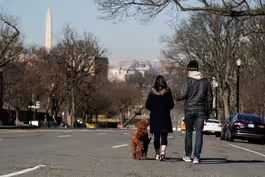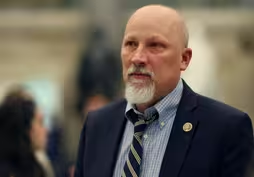
Democratic Party to vote on rearranging primary calendar
Clip: 2/2/2023 | 9m 10sVideo has Closed Captions
Democratic Party battles over rearranging its presidential primary calendar
Democrats will soon vote to rearrange their calendar for the presidential primaries in 2024 and beyond and it could have major ramifications for the party. The plan moves South Carolina to the top of the calendar and would be the first time in more than 50 years that Iowa and New Hampshire won’t be the first caucuses and primary. Lisa Desjardins reports.
Problems playing video? | Closed Captioning Feedback
Problems playing video? | Closed Captioning Feedback
Major corporate funding for the PBS News Hour is provided by BDO, BNSF, Consumer Cellular, American Cruise Lines, and Raymond James. Funding for the PBS NewsHour Weekend is provided by...

Democratic Party to vote on rearranging primary calendar
Clip: 2/2/2023 | 9m 10sVideo has Closed Captions
Democrats will soon vote to rearrange their calendar for the presidential primaries in 2024 and beyond and it could have major ramifications for the party. The plan moves South Carolina to the top of the calendar and would be the first time in more than 50 years that Iowa and New Hampshire won’t be the first caucuses and primary. Lisa Desjardins reports.
Problems playing video? | Closed Captioning Feedback
How to Watch PBS News Hour
PBS News Hour is available to stream on pbs.org and the free PBS App, available on iPhone, Apple TV, Android TV, Android smartphones, Amazon Fire TV, Amazon Fire Tablet, Roku, Samsung Smart TV, and Vizio.
Providing Support for PBS.org
Learn Moreabout PBS online sponsorshipGEOFF BENNETT: Democrats will soon vote to rearrange their calendar for the presidential primaries and 2024 and beyond.
It could have major ramifications for the party.
Lisa Desjardins is here to break down with Democrats see as the pros and cons of President Biden's plan to reshape the party's nominating contest.
LISA DESJARDINS: The president's plan likely to get a vote by Democrats in Philadelphia this weekend calls for historic change, jumping South Carolina, the state that changed the course of his candidacy in 2020, to the top of the calendar.
If it comes to pass, Iowa would be no longer among the first states and New Hampshire would no longer have the first primary.
Joining me to discuss the proposal are two political veterans, Faiz Shakir, campaign manager for Bernie Sanders in 2020, and Jalisa Washington-Price, a veteran of Hillary Clinton's 2016 campaign and the Biden/Harris ticket in 2020.
Thank you both.
Let's start with where you agree.
You both believe that something needs to change here in the Democratic calendar.
I do want to get a word in from New Hampshire, which is defiant about this.
Here is what New Hampshire's Governor Sununu said.
No surprise, he doesn't like the idea.
GOV.
CHRIS SUNUNU (R-NH): You can come and try and take it, but it is never going to happen.
For 100 years, New Hampshire has given voice to lesser-known candidates and provided a pathway to the presidency for anyone dedicated enough to test their mettle with the New Hampshire voters.
AMNA NAWAZ: Chris Sununu knows that Iowa and New Hampshire are proud of American political culture.
They say it's a place where voters have access to candidates.
But you say, no, it's time to change.
Why?
FAIZ SHAKIR, Democratic Strategist: Well, they're not wrong, Lisa.
The small-town setting in New Hampshire is wonderful.
You see people who really take the responsibility seriously.
They turn out in high numbers.
That said, it doesn't mean that they're owning the space forever.
There should be, there can be new entrants to that.
There should be other people who have an opportunity to have the first-in-the-nation status.
And I think Georgia, Michigan, Nevada all - - they all make sense.
And so I think it's a good time to refresh that and look at things that -- anew, with a new eye.
LISA DESJARDINS: So, Lisa, part of being a smart campaign person like you are is knowing the demographics of your voters.
Can you talk about demographic change in this country and among Democrats and how that plays into why you think things should change?
JALISA WASHINGTON-PRICE, Democratic Campaign Strategist: Of course.
When you think about the base of the Democratic Party, you think about exactly the calendar that's set in front of us, right?
You're starting with South Carolina, which have has a very large African American voting population, and then moving to Nevada, which is a minority-majority state with a strong Latino, AAPI, Native American presence, as well as a strong coalition of union workers as well.
And then you think of the historical nature of New Hampshire, which is still on the calendar, and then moving into Michigan and Georgia, and, like I said, this really makes up the coalition and the base of the Democratic Party.
LISA DESJARDINS: Now, you two disagree about something.
And it has to do with a state that I care very much about, South Carolina.
Now, however, I'm not biased on who goes where in the calendar.
And I want to ask you, first, Faiz, why do you think it would be a mistake to put South Carolina first, as President Biden wants to do?
FAIZ SHAKIR: Well, among many good options, I don't think South Carolina is one of them.
It's a very conservative state, a lot of elderly people, a lot of voters who are hostile to progressive values, anti-women, anti-labor, anti a lot of things that Democrats stand for.
Jaime Harrison, the DNC chair, spent been $120 million or $130 million trying to win a Senate seat against Lindsey Graham two years ago and lost by 12 points, meanwhile, in the same period of time in which we have seen places like Michigan, Georgia, Nevada move to the Democratic column, right, and show that they are voters who like progressive values in those states.
So if we have this opportunity to remake the map, why would you move South Carolina to the front of the line?
Why not some of these other states who have, in my view, a better argument, have a delight diversity argument, have pro-Democratic values arguments?
When we're talking about selecting a president of the United States, let's not preference just the fact that a conservative state that is hostile to Democratic values that happened to help the president be first in line.
It should be who helps the Democratic ticket.
LISA DESJARDINS: I'm going to get a response from Jalisa, but I want to ask.
You said elderly voters.
Why is that a problem, having a high number of elderly voters?
FAIZ SHAKIR: They tend to be -- so, they're disproportionately elderly in South Carolina, which it tends to associate with more conservative views on some of these things... (CROSSTALK) LISA DESJARDINS: For Democrats.
(CROSSTALK) FAIZ SHAKIR: So, when you talk about LGBT views, and you talk about abortion views, you talk about labor views, what we found as a campaign when you're campaigning in that state, as opposed to many other states, more concern and opposition to the core Democratic values.
LISA DESJARDINS: Jalisa, why do you think Faiz is wrong about South Carolina?
Why do you think it should start the process for Democrats?
JALISA WASHINGTON-PRICE: Definitely.
I'm going to strongly disagree with our friend here.
Not only the case that South Carolina has a large African American population.
As we know, within Black voters, they aren't a monolith, right?
South Carolina is home to six HBCUs, when you're thinking about talking to the importance of education and talking to -- these candidates need to talk to students and the issues that are important to them.
When you think about the large military community that's in South Carolina, issues that affect them and their family.
Seniors do make a large population of the state, but they also talk about the issues that affect them.
Rural voters and farmers in the state.
Keeping South Carolina at the top of the primary calendar will give all of these demographics and communities an opportunity to talk about issues that are important to them.
Also too, Democrats should compete everywhere, right, not just in states that they will win.
Being in a state like South Carolina can also make sure that these candidates are battle-tested when they go -- when it's time to go to the general election.
South Carolina is also a smaller state.
A candidate that don't have -- doesn't have the resources like some of the major campaigns or some of the larger campaigns can actually go into a state like South Carolina and really compete and really talk to voters where they are.
South Carolina also borders states like North Carolina and Georgia, which allows us to message to the -- to voters in these states as well.
So, I really have to push back with my friend here when he talks about how conservative the voters in South Carolina are.
That's just not true.
The Black voters in South Carolina really align with the values that the Democratic Party has.
And that includes progressive issues.
LISA DESJARDINS: You are both touching on something important here, which is, it's not just about the Democratic primary, right?
This is about who we choose as president, one-half of the decision being made by generally usually Democratic voters.
So I want to ask both of you.
This decision about who votes where, can you talk about who could -- who we might see emerge from that as a candidate more likely if the system changes?
Faiz?
FAIZ SHAKIR: Well, how the system changes is important to answering this question.
If it were South Carolina, I don't want people skipping over South Carolina and moving on to their next states.
You want people to compete in the calendar as it's presented.
And so I would say that, if you wanted to reform this calendar, and you wanted to make it effective, we would be moving places like Nevada, Georgia and Michigan to the front of the line.
Taking all of the comments that were made by my friend here about South Carolina, I would flip it on its head.
You could say all of those things about a state right near here, Maryland, higher proportion of Black voters in that state, first Black governor there in Maryland.
So, you could make this argument that, if we were talking about Black voters, why not Maryland?
Why not Georgia?
Why not North Carolina?
So I just think that there's -- among many options -- and I appreciate the defense of South Carolina -- I don't think it's as good of an option as any of the others.
Put a Democratic candidate in the position to have to win a battleground state early on, and prove that they can go before a general election audience and win.
LISA DESJARDINS: Jalisa, I will give you the last word in those last 30 seconds or so.
You can defend South Carolina again, but, also, what do we think this would do to changing the character of the candidates?
JALISA WASHINGTON-PRICE: You know, I'm going to start off by just saying I push back again with that.
You -- why not South Carolina?
He lists a host of other states that could - - also has a very significant Black population.
But South Carolina, who has been a part of the primary calendar for a while, I mean, we are familiar with what it takes for presidential candidates to come into a state like South Carolina and really campaign on the issues that we care about, right?
So, why not push that up to the top of the calendar, so some of these candidates have to come in and talk about Black issues early and often, and really talk about how policies that they want to implement are going to affect community -- African American communities and communities of color?
LISA DESJARDINS: OK. FAIZ SHAKIR: Can I just suggest a compromise real quick?
LISA DESJARDINS: One sentence.
FAIZ SHAKIR: Real quick compromise is that, for 2024, Biden should get his pick.
Mandate a new state to be at the front of line in 2028.
LISA DESJARDINS: All right, look at that, compromise.
(CROSSTALK) LISA DESJARDINS: I am so sorry.
We have got to -- for time.
But we will continue this conversation, not just the parties, but the states.
Thank you so much, Jalisa, Faiz, for joining us.
FAIZ SHAKIR: Thank you.
Ben Platt and Noah Galvin discuss their film 'Theater Camp'
Video has Closed Captions
Clip: 2/2/2023 | 7m 58s | Actors Ben Platt and Noah Galvin discuss their acclaimed mockumentary 'Theater Camp' (7m 58s)
Pedestrian deaths in U.S. reach highest level in 40 years
Video has Closed Captions
Clip: 2/2/2023 | 10m 7s | Pedestrian deaths in U.S. reach highest level in 40 years (10m 7s)
Rep. Chip Roy on the agenda of the GOP's House majority
Video has Closed Captions
Clip: 2/2/2023 | 7m 7s | Texas Rep. Chip Roy on the agenda of the GOP's House majority (7m 7s)
Ukraine builds war crimes case against Russia
Video has Closed Captions
Clip: 2/2/2023 | 7m 18s | Ukraine's top prosecutor builds war crimes case against Russia as invasion grinds on (7m 18s)
U.S. expands presence in Philippines to counteract China
Video has Closed Captions
Clip: 2/2/2023 | 4m 47s | U.S. boosts military presence in Philippines to counteract China's increasing aggression (4m 47s)
Providing Support for PBS.org
Learn Moreabout PBS online sponsorship
- News and Public Affairs

FRONTLINE is investigative journalism that questions, explains and changes our world.

- News and Public Affairs

Amanpour and Company features conversations with leaders and decision makers.












Support for PBS provided by:
Major corporate funding for the PBS News Hour is provided by BDO, BNSF, Consumer Cellular, American Cruise Lines, and Raymond James. Funding for the PBS NewsHour Weekend is provided by...




